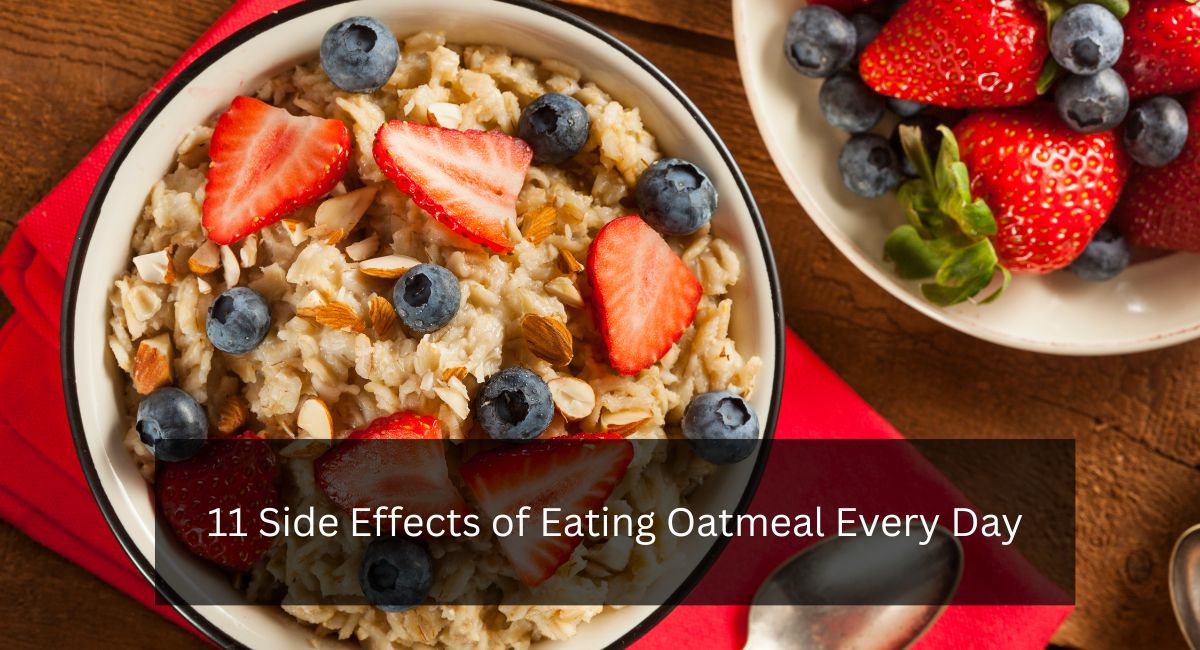Oatmeal is often touted as a healthful breakfast option, loaded with beneficial nutrients like fiber, protein, and vitamins. However, as with any food, consuming oatmeal every day can have its downsides. In this article, we’ll explore 11 potential side effects of eating oatmeal daily.
1. Gastrointestinal Issues
Oatmeal is high in fiber, which is beneficial for digestive health. However, consuming it in large quantities every day can lead to gastrointestinal issues such as bloating, gas, and constipation, especially if your body isn’t used to high fiber intake.
2. Nutrient Imbalance
While oatmeal contains several essential nutrients, it doesn’t have everything your body needs. Relying too heavily on oatmeal can lead to a lack of variety in your diet, potentially causing deficiencies in other nutrients.
3. Blood Sugar Spikes
Oatmeal is a carbohydrate-rich food, which means it can cause spikes in blood sugar levels, especially if consumed in large amounts or if the oatmeal is highly processed, like instant varieties.
4. Weight Gain
Though oatmeal can be part of a weight loss diet due to its high fiber content, overeating can lead to weight gain. This is particularly true if your oatmeal is laden with sugary toppings or made with whole milk or cream.
5. Unwanted Flavor Fatigue
Eating the same food every day can lead to flavor fatigue. Your taste buds might get tired of oatmeal, making your meals less enjoyable and possibly leading you to seek out less healthy alternatives.
6. Possible Gluten Contamination
For those with gluten sensitivities or celiac disease, consuming oatmeal that isn’t certified gluten-free can be problematic. Oats are often processed in facilities that handle wheat, barley, and rye, leading to cross-contamination.
7. Reduced Appetite
Oatmeal is quite filling, which can be a double-edged sword. While it can help control hunger, eating it every day, especially in large portions, might reduce your appetite for other necessary foods, leading to an imbalanced diet.
8. Impact on Mineral Absorption
Oats contain phytic acid, a compound that can bind minerals such as iron, zinc, and calcium, reducing their absorption. Eating oatmeal every day could potentially lead to deficiencies in these minerals, especially if your diet is already low in them.
9. Allergic Reactions
Though rare, some people may have an allergic reaction to oats. Symptoms can include itching, swelling, and gastrointestinal distress. If you notice any adverse reactions after eating oatmeal, it’s best to consult a doctor.
10. Overconsumption of Additives
Many commercial oatmeal products come with added flavors and sweeteners. Daily consumption of these can lead to an overintake of sugar, artificial flavors, or preservatives, which are not beneficial for health.
11. Pesticide Exposure
Non-organic oats may be treated with pesticides during cultivation. Regular consumption of such oats could increase your exposure to these chemicals, which is a concern for some people.
Conclusion
Oatmeal can be a nutritious and convenient option for breakfast or snacks. However, like any food, it should be consumed in moderation and as part of a varied diet. Paying attention to the type of oats, portion sizes, and toppings can help mitigate some of the side effects mentioned above. Always listen to your body and make dietary choices that support your individual health needs.
-
The Top 10 Superfoods for Brain Health, Weight Loss, and More

Incorporating superfoods into your diet can significantly enhance your overall health, providing essential nutrients that promote brain function, aid in weight loss, and contribute to various other health benefits. Here’s … Read more
-
Coke Zero vs. Diet Coke

For decades, Coca-Cola has offered two sugar-free cola options: Diet Coke and Coke Zero. Both beverages boast zero calories and zero sugar, leaving many consumers wondering – what’s the real … Read more
-
A New Study Says Gray Hair May Be Reversible

Hair color comes from melanin, a pigment produced by melanocyte stem cells located at the base of hair follicles. These melanocyte stem cells go through different stages, and at each … Read more
